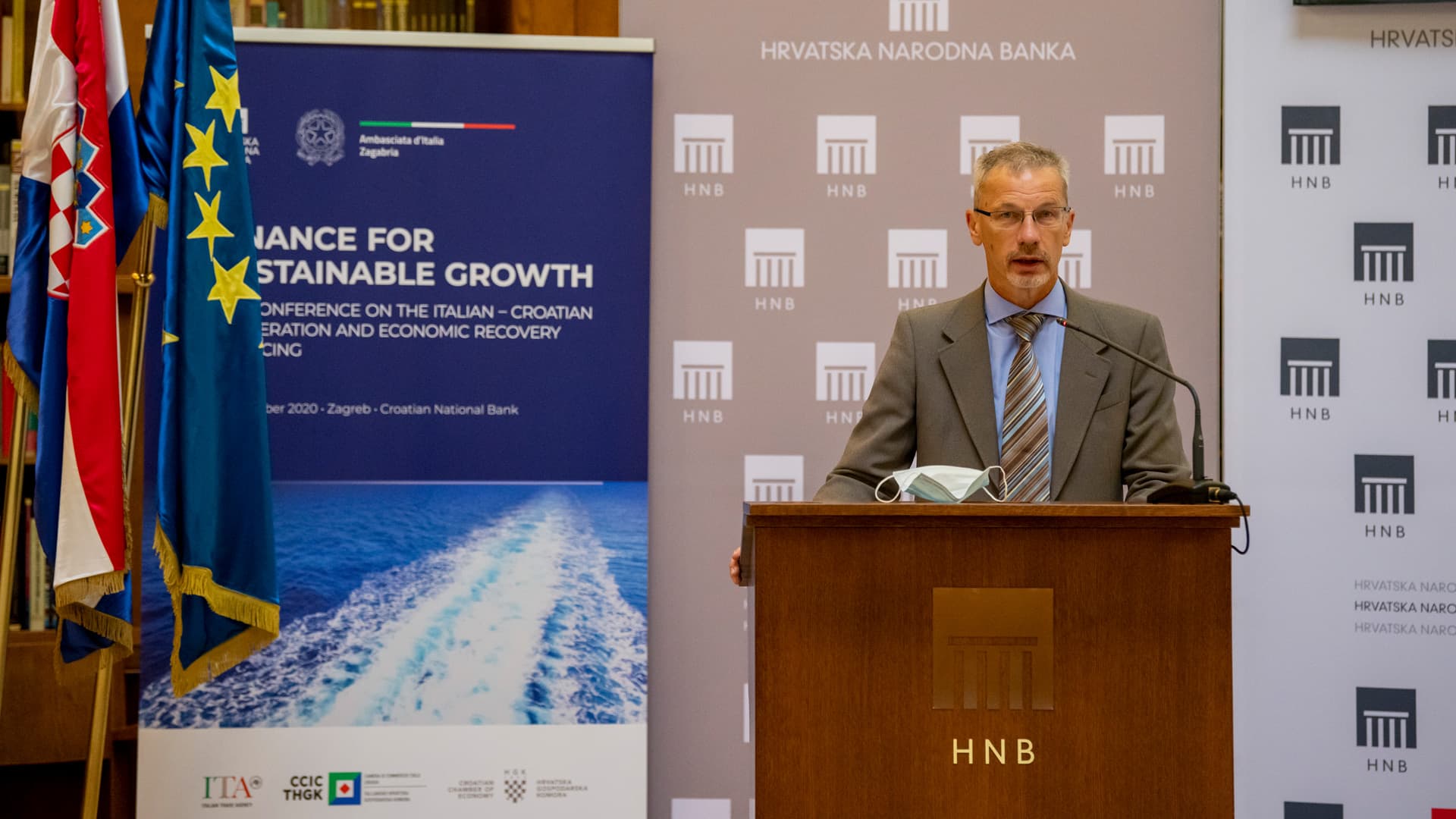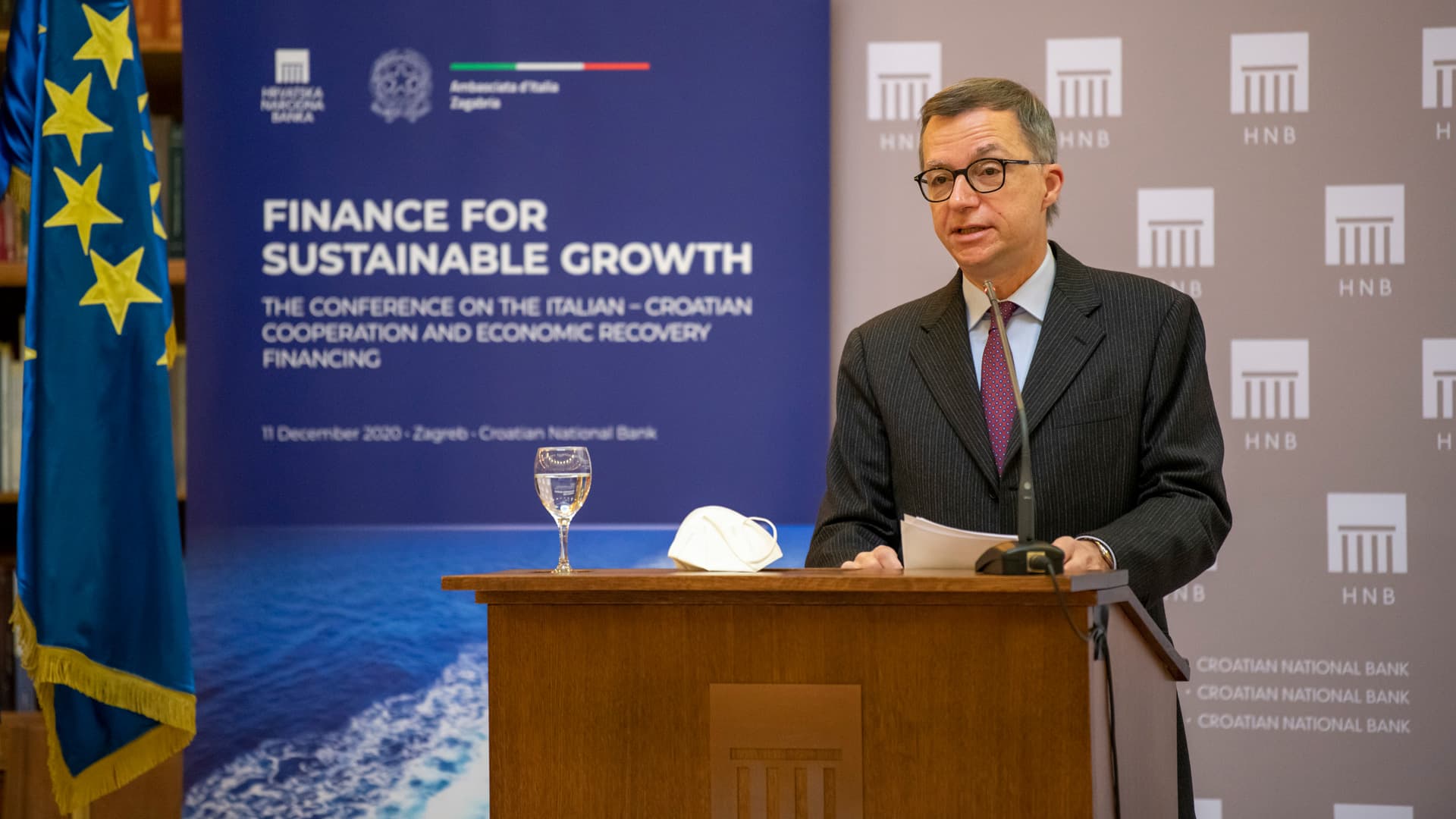
Boris Vujčić, Governor of the Croatian National Bank
The general idea of this conference is to gather experts from Italy and Croatia to discuss topics that are of high relevance for both of our countries, and that strongly interlink our economies. Our joint objective, which also corresponds to the European long-term objective, is to create economic conditions for a more sustainable growth based on green economy, innovation and digitalisation. Achieving this goal requires financial support for SMEs and for innovative and environmentally friendly projects, said Governor Boris Vujčić in his opening remarks at the online conference on the Italian-Croatian cooperation and economic recovery financing entitled "Finance for Sustainable Growth", which was held on December 11 and jointly organised by the Croatian National Bank and the Embassy of Italy. The Governor noted that the conference offered an opportunity to discuss policies to address these common challenges and stimulate productivity and sustainable growth, possibly also by further enhancing the Italian-Croatian cooperation in tourism, energy and finance.
Ambassador of the Italian Republic to the Republic of Croatia, Pierfrancesco Sacco, on this occasion said: Our conference today, in this splendid hall and with so many eminent lecturers, speaks of the importance that Croatia and Italy attach to their historic friendship. The Italian – Croatian Committee of Ministers that took place in Zagreb ten days ago provides us with the right context. The key political message there is crystal clear: Italy and Croatia need each other.

Pierfrancesco Sacco, Ambassador of the Italian Republic to the Republic of Croatia
Ambassador Sacco also emphasized that Croatia and Italy share the view that their economies have more chances to recover from the pandemic and be more resilient in the future, if they further strengthen their ties. At governmental and policy level but also – and very importantly - at the business level. The artery systems of our two economies – the banking and the financial sectors - are fit for the job of updating and relaunching the Italian and the Croatian historic partnership, because they are closely intertwined, concluded Ambassador Sacco.
Opening speeches at the conference were also given by Zdravko Marić, Deputy Prime Minister and Minister of Finance of the Republic of Croatia, Manlio di Stefano, Undersecretary of State for Foreign Affairs of the Italian Republic, Ivan Barbarić, Vice President for International Affairs and EU of the Croatian Chamber of Economy, Gianfranco Bisagni, Co-CEO Commercial Banking CEE of Unicredit Spa, Marco Elio Rottigni, Head of International Subsidiary Banks Division, Intesa Sanpaolo Spa, and Daniele Franco, Director-General of Banca d’Italia.
The first panel entitled "Public and private investment for economic recovery and growth", which was moderated by Milan Deskar-Škrbić, advisor at the CNB, focused on the most efficient ways in which Croatia and Italy may use the available EU funds and instruments to alleviate the economic and social damage caused by the pandemic. CNB Deputy Governor Sandra Švaljek, Šime Erlić, State Secretary of the Ministry of Regional Development and EU funds, Victoria Zinchuk, EBRD Director for Croatia, Francesco Ruffoli, President of the Italian-Croatian Chamber of Commerce, and Fabrizio Balassone, Head of Structural Economic Analysis Directorate, Banca d'Italia, also discussed which sectors could be seen as most promising for future FDIs between Croatia and Italy and whether there was a scope for Croatia and Italy to invest jointly in projects in other countries, with special regard to South East Europe.
The role of the financial sector in economic recovery was examined in depth by the speakers of the second panel: Vedran Šošić, CNB Chief Economist, Romeo Collina, Chairman of the Management Board of Zagrebačka banka, Dinko Lucić, President of the Management Board of Privredna banka Zagreb, Col. Pietro Bianchi, Head of Research and Analysis at the Ministry of Economy and Finance of the Italian Republic (Guardia di Finanza), Marijana Oreb, Member of the Board of Directors of HAMAG-BICRO, and Francesco Tilli, Director of External Relations at SIMEST, an Italian company that finances and supports the economy. In the discussion moderated by Marko Jurčić, Advisor to the President of the Croatian Chamber of Economy, the panellists spoke about the most prominent strengths and risks for the Croatian and Italian banking sectors and the role which banks should play in supporting innovative SMEs and building their businesses.
Energy and business were the topics of the third panel, moderated by Maja Pokrovac, Director of Association for Renewable Energy Sources of Croatia. The panel addressed the business opportunities enabled by circular economy and opening up new avenues of cooperation between Croatia and Italy, the measures and reforms necessary in order to accelerate the renewable energy transition and development, the financial instruments available to support the redesigning of the industrial ecosystem and the European Green Deal. The panellists included Tamara Perko, President of the Management Board of HBOR, Milan Horvat, President of the Supervisory Board of FIMA Invest, Alberto Pinori, President of ANIE Rinnovabili, the Italian renewable energy industry association, and Gianbattista Semeraro, Projects Director of FATA EPC, the company for industrial plant construction.
The last panel discussion on tourism tried to provide the answers to the questions on the measures necessary to balance the domestic and foreign tourist demand amidst the pandemic, the impact of the poor summer tourist season on future investments as well as the direct benefits from the entry into the euro area for the tourism industry. The panel moderator was Damir Krešić, Managing Director of the Croatian Institute for Tourism, and the participants included Tonči Glavina, State Secretary of the Ministry of Tourism and Sport of the Republic of Croatia, Kristjan Staničić, Director of the Croatian National Tourist Board, Željko Kukurin, President of the Catering and Tourism Association of the Croatian Employers’ Association, Marina Lalli, President of Federturismo Confindustria, the Italian Travel and Tourism Federation, and Paola Pacchiana, Internationalisation Ambassador, Associazione Startup Turismo.
The conference of the Croatian National Bank and the Embassy of Italy was organised in a hybrid format: a smaller number of the speakers and panellists were present in the CNB’s Round Hall, while all participants, as well as the media, were logged in online.
